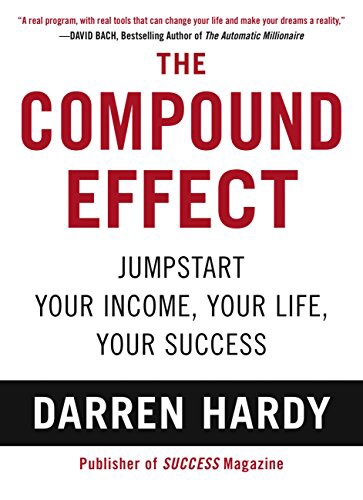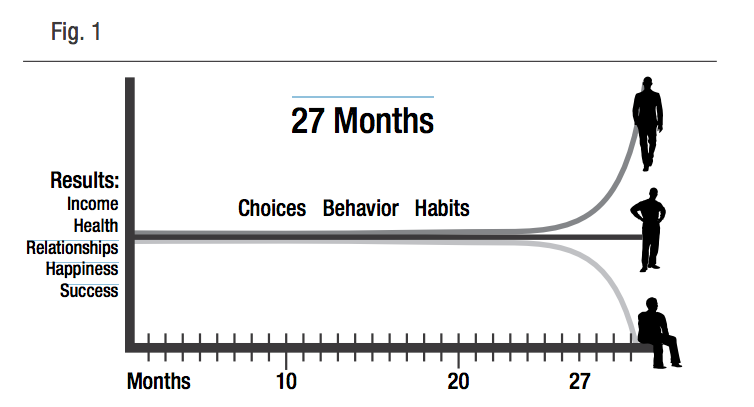 The Compound Effect (affiliate link)
The Compound Effect (affiliate link)
This book on personal development focuses, as the title indicates, on the power of small steps. At the crux of this book is the concept that over time, consistent, persistent small steps make overwhelming differences in life, for good or evil.
Special message from Anthony Robbins
- Jim Rohn: success is a science. The laws apply to everyone.
- Your decisions shape your destiny.
INTRODUCTION
- Overnight success marketing distorts our thinking about what it takes to succeed.
- Jim Rohn: There are no new fundamentals. Truth is not new, it?s old. Be suspicious of the guy with ?new antiques.?
- Success is not just hard, it can be boring.
- You know what you need to succeed. You don?t need new info, but a new plan of action.
CHAPTER 1: THE COMPOUND EFFECT IN ACTION
- Doesn?t matter how smart you are. Just work harder, work smarter. Personal responsibility.
- Be the guy who says no. It?s no achievement to go along with the crowd.
You haven?t experienced the payoff of the compound effect
- Compound Effect: reaping huge rewards from a series of small, smart choices. Steps feel insignificant, results are massive.
small smart choices + consistency + time = RADICAL DIFFERENCE
The magic penny
- Do you want $3 million now, or a penny that doubles each day for 31 days?
- If you double a penny each day for 31 days, you end up with $10.7 million. But you don?t pull ahead until the very last day
Three friends
- 5 months isn?t enough to see real decline or improvement. Only 18 months-2 years do effects start showing up.
- You either let the compound effect take you down, or you use it for your benefit.
The ripple effect
- Even one small change can have a significant impact
- Jeff Olson: The Slight Edge repeat simple daily disciplines
 bigmoose
bigmoose
Success, old school
- The secret: hard work, discipline, good habits
- Wealth tends to skip a generation. Children of wealthy don?t develop discipline and character to create or maintain wealth.
- We?ve lost appreication of a strong work ethic, respect for our forefathers? struggle.
- Nothing fails like success
Microwave mentality
- Forget insta-results.
- Daniel Gilbert: Stumbling on Happiness most lottery players lose.
- Athletes who succeed: start before and end after others. Faced failure, loneliness, hard work, disappointment.
- Only path to success: through mundane, difficult, unexciting daily disciplines over time.
- The compound effect is always working. Either you make it work for you or it will have negative effects.
Put the compound effect to work for you
- Write out your excuses, decide to make up for them with hard work and personal development
- Write out a half-dozen small, seemingly insignificant steps you can do every day to go a different direction
- Write the small seemingly insignificant things you can stop doing to stop your downward spiral
- List a few areas/skills/outcomes where you?ve succeeded in the past. Are you taking those for granted and not improving?
 ?Bowl of fragrant popcorn to munch on? by Alex Munsell on Unsplash
?Bowl of fragrant popcorn to munch on? by Alex Munsell on Unsplash
CHAPTER 2: CHOICES
- We all come into the world the same, the life we end up with is an accumulation of our choices.
- Everything in your life exists because of a choice you made
- You make choices, then choices make you
- Every choice has an impact on your life?s Compound Effect
- Be aware of your choices. How many of your behaviors have you not voted on?
- Your biggest challenge: you?re sleepwalking through your choices
- Many of our choices: shaped by culture/upbringing
Elephants don?t bite
- Little things bite. Like mosquitoes. Like decisions you think don?t make a difference.
- Don?t let yourself make a choice without thinking.
Thanksgiving year-round
- Darren kept a thanksgiving journal for his wife, wrote down at least one thing he appreciated about her each day, and gave it to her.
Owning 100 percent
- We?re all self-made people, but only the successful take credit.
- How to make a relationship work: Be willing to give 100% with 0 expectation of anything in return. Relationships left to chance = disaster
- If you ever blame anyone for anything, you?re not taking 100% responsibility
Getting lucky
- We are all lucky. If you?re alive, relatively healthy, have food, you?re lucky.
- Luck surrounds us each day. We have to take advantage of it.
preparation (personal growth) + attitude (belief/mindset) + opportunity + action = luck
- Attitude is where luck evades most people. See all events as fortuitous.
- You can?t see what you?re not looking for, you can?t look for what you don?t believe in.
The high price of tuition at UHK (University of Hard Knocks)
- Take responsibility for whatever happened to you ? good, bad, victory, defeat. Own it.
Your secret weapon ? your scorecard
- Pick an area you want to be successful in. Picture where you are now, where you want to be.
- 1st step toward change: awareness.
- Be aware of the choices that lead you away from your desired destination.
- Track every action that relates to the area of life you want to improve.
- Jim Rohn: What?s simple to do is also simple not to do.
- Magic: do simple things repeatedly for long enough that the Compound Effect kicks in.
Money trap
- Tracking is Hardy?s go-to transformational model for everything wrong: eating/drinking, finances, exercise, relationships
- Track your life to bring your goals within sight. Casinos make money by tracking tables. Track yourself like you?re a valuable commodity because you are.
- You?re not as aware of your habits as you think you are.
 ?A flatlay with a laptop, a notepad, a smartphone and a mug of coffee? by Andrew Neel on Unsplash
?A flatlay with a laptop, a notepad, a smartphone and a mug of coffee? by Andrew Neel on Unsplash
Keep it slow and easy
- Just track one habit for one week ? the habit with the greatest control over you.
- Now track for three weeks.
- Merely becoming conscious of your actions begins to shape them.
- Spending one buck today is like taking $5 out of your future pocket.
- How to buy an item by assessing from future-value standpoint: multiply current price by 5. If it?s still worth it, then buy it.
The unsung, unseen hero
- Don?t expect immediate fanfare. Small course corrections are near invisible but will produce great results in time.
- The horse that wins by a nose gets 10x prize money.
Take a walk
- Appreciating employees performance = better performing employees
Money tree
- Feed your mind with hundreds of hours of inspirational/instructional content and your creativity will soar
Time is of the essence
- The sooner you start making small changes, the more powerfully the Compound Effect works for you.
- Retirement, for example. Start saving at 23 vs at 40is the difference of $300K
- Procrastination on behaviors, habits, disciplines, is dangerous!
- The key is to start now.
- Brian Tracy: Focal Point: how to improve any area of life by 1,000% by improving yourself 1/10 of 1% per day (1/1000 per day) = improve by 1/2% per week = 2% per month = 26% per year = 1000% in 10 years.
Sucess is a (half-) marathon
- First step: find your motivation
- Choose one new habit, get hooked, the other behaviors will fall in line.
- Start with an easy task
- Why-power will fuel your new health habits
- Life is a product of moment-to-moment choices
- Think of your happiness and ultimate goal as being ?warm? (close). Every choicie is getting you closer to that ultimate goal.
- Both losing and winning are habits.
Put the compound effect to work for you: Summary action steps
- Journal about the area/person/situation you struggle with the most ? write which aspects of the situation you?re grateful for.
- Where in life are you not taking 100% responsibility for success/failure? Write down 3 things you did that messed up. 3 things you should have done but didn?t. 3 things that happened where you responded poorly. 3 things you can start doing now to take back responsibility.
- Track at least one behavior in the area you want to improve.
 Photo by Pepi Stojanovski on Unsplash
Photo by Pepi Stojanovski on Unsplash
CHAPTER 3: HABITS
Creatures of habit
We are what we repeatedly do ? Aristotle
- We?re born with instincts, not habits ? those we develop over time.
- Successful people aren?t more intelligent/talented, they just have habits that help them be more informed, knowledgeable, skilled, prepared, competent. Ex: Larry Bird, basketball (practiced harder than anyone else)
- You can condition your automatic/unconscious responses to be that of a developed champion.
- With enough practice/repetition, any behavior becomes automatic over time.
Start by thinking your way out of the instant gratification trap
- Immediate gratification turns us into reactive, nonthinking animals
- Indulging bad habits has no negative effects in the moment
- Slight adjustments to daily routines can alter life outcomes
Most people drift through life without devoting much conscious energy to figuring out specifically what they want and what they need to do to take themselves there.
Finding your mojo ? your why-power
- To fight bad habits, you need something stronger than willpower (which is like a napkin nagainst a bear)
- Use WHY power
- Whats your reason to make significant improvements in your life
- Your WHY must be fantastically motivating to you, inspiring you to GO?for years
Why everything?s possible
- If the reason is big enough, you can perform any how
- Look beyond money and material goals ? those can?t recruit your heart/soul/guts
- Success without fulfillment is failure
Core motivation
- Access your WHY power through your core values
- When actions conflict with values, you?ll be unhappy, frustrated, despondent. Nothing causes more stress than incongruent actions with values
- Decision making is easier when you know your core values.
Find your fight
- People are motivated by something they want or don?t want
- Love is a motivating force, but so is hate: Hate can be good (Hate ignorance, disease, complacency)
- Without a motivating fight we can become fat/lazy
- Take back control by not blaming chance, fate, etc.
 Photo by NeONBRAND on Unsplash
Photo by NeONBRAND on Unsplash
Goals
- If you?re not making progress you want to and can make, your goals aren?t clearly defined enough
How goal setting actually works: the mystery ?secret? revealed
- You only see, experience, get what you look for.
- If you don?t know what to look for, you won?t get it. We are goal-seeking creatures
- Our brains constantly try to align our outer world with what we experience in the inner world. So instruct your brain to look for things you want, and you will see them.
- We?re bombarded by billions of sensory info each day. To stay sane, we ignore 99.9% of them, and focuses on what we want to focus on.
- Defining your goals gives your brain something to focus on and look for.
- Top people have very clear goals. They know who they are & what they want.
- Unsuccessful people?s goals are like marbles rattling in a can ? fantasies like bullets without powder
- Go for whole-life success, balance in all aspects: business, finance, health, spirituality, family, lifestyle
Who you have to become
- Once you have your goal, don?t first ask ?what do I need to do to get it? but ?who do I need to become??
- Ex: Darren Hardy made a list for his perfect wife, then decided he needed to be a better man to win her.
Behave yourself
- What stands between you and your goal is behavior.
You ? choice + behavior + habit + compounded time = goals
- Your first job: become aware of how you?re behaving
- Write top 3 goals, and a list of the bad habits that may be sabotaging your progress in every area.
Game changers: Five strategies for eliminating bad habits
- Identify your triggers ? what triggers each of your bad habits (Who, What, When, Where) What emotions trigger your worst habits?
- Clean house ? Get rid of whatever enables your bad habits
- Swap it ? how can you alter your bad habits so they?re not as harmful? Replace or remove them? Play around and see which works for which behaviors.
- Ease in ? take small steps to unwind long-standing deep-rooted habits
- Or jump in ? paradoxically, it can be easier to change a great many habits at once. Anticipation of water can be worse than the reality of just jumping in. We have a homeostatic ability to adjust to unfamiliar behavior changes.
Run a vice check
- Most everything is good in moderation.
- How to tell if a bad habit is becoming a boss? Do a fast on one vice, and make sure you?re still alpha dog in the relationship.
- If it?s hard to abstain, you may consider cutting it out of your life.
Game changers: Six techniques for installing good habits
You will never change your life until you change something you do daily ? John C. Maxwell
- It takes 300 instance of positive reinforcement to turn a new habit into an unconscious practice ? almost a year of daily practice!
- Key: stay aware. Pay attention to it at least once a day and you?ll succeed.
- Set yourself up to succeed ? any new habit must work inside your lifestyle
- Think addition, not subtraction ? It?s not what you take out of your diet but what you put in. Focus on what you can have so you have no attention/hunger for what you have to sacrifice. What can you add to enrich your life?
- Go for PDA: Public Display of Accountability ? get accountability
- Find a success buddy ? someone to walk arm in arm with you toward the same goal.
- Competition & Camaraderie ? friendly competition
- Celebrate! ? make time to relax, read for fun
Change is hard: Yippee!
- Everyone hates doing the same things. But successful people do them anyway
- Be happy when things are hard because most others won?t do what it takes, it?ll be easier for you to step in front and take the lead.
Be patient
- Patterns of thoughts and actions ?neuro signature/brain groove.
- Attention feeds habit. But brains are malleable. Grooves can weaken, new grooves can form.
Put the Compound Effect to Work for You
- Identify your 3 best habits and your 3 worst
- Identify 3 new habits you need to develop (see www.TheCompoundEffect.com/free)
- ID your core motivation ? what gets you fired up to achieve big results
- Find your why-power. Design concise, compelling, awe-inspiring goals.
 Photo by Ian Schneider on Unsplash
Photo by Ian Schneider on Unsplash
CHAPTER 4: MOMENTUM
Harnessing the power of Big Mo
- Aka Motivation.
- Law of Intertia: objects at rest tend to stay at rest; in motion stay in motion. Rockets use more fuel during the first fewminutes of flight than the rest of the trip.
- The hard part is getting off the ground
- Momentum works both ways ? for or against you. Don?t leave negative habits unchecked.
Routine power
- Some of our best intentions fail because we don?t have a system of execution
- Athletes often have ?pre-kick routines?
Bookend your days
- Have routines for how your day starts and ends
Rise & shine
- In the mornings, review/set top MVPs (Most Valuable Priorities)
- ?If I only did 3 things today, what are the actions that will produce the greatest results in moving me closer to big goals??
Sweet dreams
- Cash out your day?s performance. How did it go compared to your plan?
Shake it up
- Interrupt your routines sometimes or life will plateau/get stale
- Example: change up your workout.
Getting into a rhythm: Finding your new groove
- Even priorities don?t happen unless scheduled on your calendar. Not with enough regulatiry to get into a rhythm.
- Create boundaries or one day will flow into the next.
- Often the people shoved aside are the most important.
- Jack Canfield idea: Interview your spouse (friend, whoever) ?How would you rate our relationship this week on a scale of 1?10, and what would i t take to make your experience a 10?
- Life is a collection of experiences, goal is to increase frequency/intensity of good experiences
- Once a quarter, have a 2?3 day getaway to do a quarterly review of goals/life patterns
Registering your rhythm
- Make a chart of weekly behaviors, and check off how often it happens
The rhythms of life
- When people get started on a new thing, they almost always overdo it ? too excited.
- You need a program you can do long term without renegotiation ? for the rest of your life
- Doing too much too soon = setting yourself up for failure.
- Do a lot for the first 60?90 days, then scale it down.
If you don?t get into something you can maintain, you won?t do it at all.
The power of consistency
- Nothing kills Big Motivation like lack of consistency
- The effort it takes to repeatedly stop/start to get backmomentum makes your trip 10x as long, and you?ll run out of fuel (energy, belief, will)
- Easier to maintain regular speed, even if it?s slower.
The pump well
- When tempted to slack off, consider the massive cost of inconsistency, loss of momentum.
- Pumping water requires many pumps before the water comes out, but once it?s up, it stays flowing.
- But if you let go of the lever too long, the water goes down and it takes effort to get it back up.
- That?s how most people live life: in fits and starts
Put the Compound Effect to Work for you
- Build your bookend morning/evening routines ? predictable, fail-safe world-class routines
- List 3 areas of life you?re not consistent enough in. What has inconsistency cost you?
- Write 6 behaviors relevant to your new goals that you want to establish a rhythm with
 Photo by Sam Schooler on Unsplash
Photo by Sam Schooler on Unsplash
CHAPTER 5: INFLUENCES
- Even seemingly insignificant choices, compounded, make an extreme impact
- Powerful external forces influence your choices, behaviors, habits
- 3 kinds of influences:
- Input: what you feed your mind
- Associations: people you spend time with
- Environment: surroundings
I. Input: Garbage in, garbage out
- Controlling what we take in is hard because most of it is unconscious. Food doesn?t leap into our minds, but input in our brains do
- Brains aren?t designed to make you happy, but to survive. It likes to seek out negatives.
- Flush your ?glass? (mind) by filling it with good stuff which will eventually clean out the bad/negative ideas
- Stand guard. You may laugh at a sitcom, but feel bloated/malnourished after, feeling like you ate fast food
- Commercials prey on your fears, pains, weaknesses. Put yourself on a media diet ? Media gives you a perverted view of the world
- 99% news has nothing to do with you
- Don?t just get rid of negative input, also put in positive.
II. Associations: Who?s influencing you?
- Who do you spend time with? who do you admire? Are they the same?
- Jim Rohn: We?re the average of the 5 people we hang out with
- People don?t shove you in a direction, they nudge you
- Write down the 5 people you hang around with the most, write down their positive and negative characteristics
- Put boundaries between you and people who drag you down
The person you?re walking with candetermine whether you sllow your pace or quicken it, literally and figuratively
- Reach out to people who have positive qualities in the areas of life where you want to improve
- You can get mentors through books, CDs, podcasts
- Find a peak-performance partner who is as committed to study and growth as you
- Invest in mentorship ? be willing to pay for and hire the best coaches and trainers
- Develop board of advisors, people who are wiser, more effective, etc.
III. Environment: Changing your view changes your perspective
- Your dream may be bigger than the environment you are in.
- Environment: not just where you live, but whatever surrounds you.
- Clear out physical and psychic clutter ? broken, not working, makes you cringe
- Everything incomplete in your life drains you
- You get in life what you tolerate
- Life organizes around the standards you set for yourself.
- We have control over how people treat us. Protect your emotional, mental, physical space.
- Life isn?t fair (but you can make the unfairness work in your favor)
Put the Compound Effect to work for you
- Identify the influence of media in your life, what you need to protect your mind from and how you?re going to keep it flushed with positive input
- Evaluate your current associations: who do you need to limit contact with, dissociate from, expand associations to?
- Pick a peak-performance partner
- ID 3 areas of life you are focused on improving. Engage a mentor in each area.
 Photo by Karim Ghantous on Unsplash
Photo by Karim Ghantous on Unsplash
CHAPTER 6: ACCELERATION
- When you?re prepared, practiced, consistently put in the effort, you will eventually come to your moment of truth, defining who you are.
Moments of truth
- It is what you do after you do your best that creates victories (Ex: Lance Armstrong pushing uphill the last moment after everyone felt dead)
- The extra effort after you?ve done your best is the difference maker.
- Hitting the wall isn?t an obstacle, it?s an opportunity.
Multiplying your results
- Simple disciplines can compound into great results ? how can you multiply/speed it up?
- The few reps you do after you hit your max will MULTIPLY your results
- Ex: Do your max reps in perfect form, then adjust your form to engage other muscles and do a few more to significantly improve results.
- ?A little more? can create massive expansion of limits
- See yourself as your own toughest competitor to multiply your results.
- Push past what others expect of you. Do more than enough.
Beat the expectations
- Ex: Oprah didn?t just give presents to a few guests ? she gave them to ALL. Other rich people could?ve done that too, but didn?t. This is what makes her Oprah.
- What little extra can you do to exceed expectations and accelerate results?
Do the unexpected
- Ex: Why send printed Christmas cards when you can handwrite Thanksgiving cards?
- Richard Branson built his career doing the unexpected
- Often the extra effort doesn?t cost much more money or energy
- If you are overly aggressive, you may lose 1/5, but you?ll win the other 4
- In our attention deficit society, doing the unexpected is required to get your voice heard
Do better than expected
- Goal: significantly surpass what people expect, using tireless preparation.
- No idea is worthwhile if itdoesn?t start with WOW ? Robert Schuller
- Exceeding expectations builds trust and loyalty
It takes very little extra to be EXTRAordinary
- Look for multiplier opportunities in all areas of life: go further, push harder, last longer, prepare better, deliver more
Put the compound effect to work for you
- ID: When do you hit your moments of truth? Push through for more growth
- Find 3 areas of life where you can do extra
- Find 3 areas of life to beat expectations, create wow moments
- Find 3 ways to do the unexpected ? where can you be different from what?s common, normal, expected?
 Photo by Jay Ma on Unsplash
Photo by Jay Ma on Unsplash
CONCLUSION
Learning without execution is useless
- Darren Hardy?s core value: significance.
- Ideas uninvested are wasted
- Look back on your life 5 years ago. Are you now where you thought you?d be 5 years later?
- Make the next 5 years different than the last 5
Get your own copy of The Compound Effect HERE (affiliate link)
Ready to be a Brilliant Writer?
I?ve created The Brilliant Writer Checklist to help you clarify your message, reach more readers, and change the world with your words.
Get the manifesto here!

